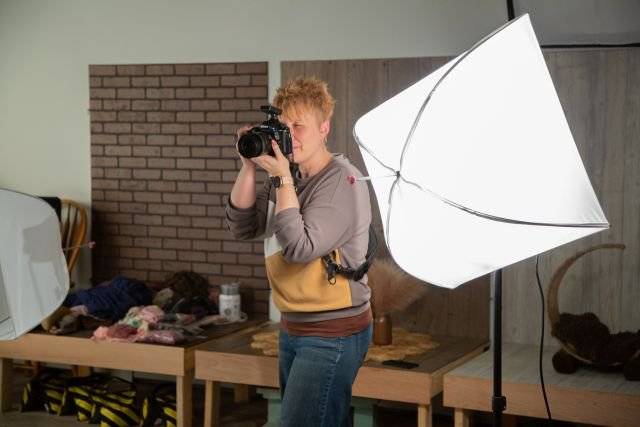Welcome to the world of photography! Whether you're a beginner or a seasoned photographer, there's always something new to learn and explore. In this blog post, we'll cover essential topics that will help you enhance your skills, unleash your creativity, and navigate the various aspects of photography. From understanding camera settings and lighting techniques to mastering composition and editing software, we've got you covered. We'll also delve into the importance of education, backup and storage, networking, business skills, finding inspiration, and embracing passion and persistence in your photography journey. So grab your camera and let's dive in!
1. Camera
Welcome to the world of photography! Investing in a quality camera is one of the most important decisions you will make as a beginner. Whether you choose a DSLR or a mirrorless camera, here are some essential tips to help you get started on your photography journey:
- Invest in a quality DSLR or mirrorless camera: Your camera is your tool for capturing stunning images. Choose a camera that suits your needs and budget, and invest in a good quality one to ensure sharp and clear photos.
- Understand the different settings and modes: Take the time to familiarize yourself with the various settings and modes on your camera. Learn about aperture, shutter speed, and ISO to have full control over your photos.
- Consider a tripod for stability: A tripod can be a game-changer when it comes to capturing sharp images, especially in low light conditions or when shooting long exposures. Invest in a sturdy tripod for added stability.
- Learn how to properly clean and maintain your camera: Regular maintenance is key to ensuring your camera functions optimally. Clean the lens, sensor, and body of your camera regularly to prevent dust and debris from affecting your photos.
- Experiment with different lenses for versatility: Lenses play a crucial role in shaping the look and feel of your photos. Experiment with a variety of lenses – from wide-angle to telephoto – to discover the style that best suits your vision.
By following these tips, you'll be well on your way to mastering your camera and capturing breathtaking images that truly showcase your creativity and passion for photography.
2. Lighting
When it comes to photography, lighting plays a crucial role in capturing the perfect shot. Whether you are shooting outdoors or indoors, understanding how to effectively use light can significantly enhance the quality of your images. Here are some key points to consider when it comes to lighting:
- Natural Light for Outdoor Shoots: One of the best light sources for outdoor photography is natural light. The soft, diffused light during the golden hours of sunrise and sunset can create stunning effects in your photos. Take advantage of these times for your outdoor shoots to achieve that magical glow in your images.
- Invest in a Good Quality Flash for Indoor Photography: When shooting indoors where natural light may be limited, investing in a high-quality flash is essential. A good flash can help illuminate your subjects evenly and reduce harsh shadows, giving a more professional look to your indoor shots.
- Experiment with Different Lighting Techniques: Don't be afraid to experiment with different lighting techniques to see what works best for your style of photography. Play around with sidelighting, backlighting, and soft lighting to create unique and visually appealing effects in your images.
- Learn How to Control and Manipulate Light for Desired Effects: Understanding how to control and manipulate light is key to achieving the desired effects in your photos. Whether it's adjusting the exposure settings on your camera or using light modifiers such as diffusers and grids, mastering light control can take your photography to the next level.
- Consider Investing in a Reflector for Added Light Control: Reflectors are versatile tools that can help bounce and redirect light onto your subjects. They are especially useful during outdoor shoots where natural light may be harsh or directional. Investing in a reflector can give you more control over the lighting conditions and help you achieve a well-balanced exposure in your photos.
By paying attention to lighting and learning how to work with different light sources, you can elevate the quality of your photography and capture visually striking images that stand out. Remember, practice makes perfect, so don't be afraid to experiment and refine your lighting skills to take your photography to the next level.
3. Composition
When it comes to photography, composition plays a crucial role in capturing visually appealing and impactful images. By understanding the fundamental principles of composition, you can elevate your photography skills to the next level. Let's delve into some key aspects of composition that every aspiring photographer should master:
- Rule of Thirds: One of the foundational principles of composition is the rule of thirds. This technique involves mentally dividing your frame into a grid of nine equal sections using two vertical and two horizontal lines. Placing key elements of your composition along these lines or at their intersections can create a more balanced and visually interesting image.
- Experiment with Angles and Perspectives: Don't be afraid to get creative with your angles and perspectives. By changing your vantage point or shooting from unusual angles, you can add depth and dynamism to your photos. Try shooting from high above, crouching down low, or experimenting with different camera angles to discover unique perspectives.
- Leading Lines and Framing: Utilizing leading lines and framing techniques can guide the viewer's eye towards the main subject of your image. Look for natural or man-made lines in your environment—such as roads, fences, or building edges—that lead towards your subject. Additionally, framing your subject within a natural or architectural frame can add context and visual interest to your photos.
- Negative Space: Sometimes, less is more. Negative space refers to the empty or blank areas in a photo that surround the main subject. By strategically incorporating negative space into your compositions, you can draw attention to the subject, evoke emotions, and create a sense of simplicity and elegance in your images.
- Storytelling through Framing: Every photograph has a story to tell. Practice framing your shots in a way that conveys a narrative or evokes a specific mood or emotion. Consider the placement of elements within the frame, the use of light and shadow, and the overall composition to communicate your intended message effectively.
Mastering the art of composition requires patience, practice, and a keen eye for detail. As you continue to explore different techniques and experiment with your photography, remember that composition is not just about following rules—it's about unleashing your creativity and expressing your unique perspective through your lens.
4. Editing Software
When diving into the world of photography, one of the key aspects that can truly elevate your images is the editing process. Investing in a good editing software like Adobe Lightroom or Photoshop can make a significant difference in the final outcome of your photos.
Learning how to enhance and retouch your photos is a skill that every aspiring photographer must master. These editing tools offer a wide range of features that allow you to adjust everything from exposure and color balance to sharpening and noise reduction. By familiarizing yourself with these tools, you can take a mediocre photo and transform it into a masterpiece.
Experimenting with different editing techniques is crucial in developing your style as a photographer. Each photo may require a unique approach, whether it's enhancing the colors to make them pop or applying filters for a creative effect. By trying out various editing methods, you can discover what works best for your particular aesthetic.
Understanding the importance of non-destructive editing is fundamental in preserving the quality of your original images. Non-destructive editing allows you to make changes to your photos without altering the original file, ensuring that you can always revert back to the initial version if needed. This flexibility gives you the freedom to explore different editing options without the fear of irreversibly changing your photos.
Practicing editing is key to honing your skills and bringing out the best in your images. The more you edit, the more familiar you will become with the software's capabilities, enabling you to efficiently enhance your photos. Take the time to edit a variety of images, from landscapes to portraits, to develop a well-rounded editing proficiency.
- Invest in a good editing software like Adobe Lightroom or Photoshop.
- Learn how to enhance and retouch your photos.
- Experiment with different editing techniques.
- Understand the importance of non-destructive editing.
- Practice editing to bring out the best in your images.
5. Education
When it comes to pursuing a career in photography, education plays a vital role in honing your skills and shaping your artistic vision. Here are some essential steps you can take to further your photography education:
- Take Photography Classes or Workshops: Investing your time and effort in structured photography classes or workshops can significantly enhance your technical knowledge and practical skills. These learning opportunities provide hands-on experience and guidance from experienced professionals to help you improve your photography.
- Watch Tutorials and Read Books on Photography Techniques: In this digital age, there is a wealth of resources available online to help you grasp various photography techniques. Watching tutorials and reading books can broaden your understanding of composition, lighting, editing, and other essential aspects of photography.
- Join Photography Communities: Being part of photography communities, whether online or in-person, gives you the chance to connect with fellow photographers, share your work, receive constructive feedback, and learn from others' experiences. Engaging with a community can inspire you and offer valuable insights into different styles and approaches to photography.
- Attend Photography Exhibitions and Events: Visiting photography exhibitions, galleries, and events can be a great source of inspiration. Seeing the work of established photographers, exploring diverse styles and genres, and immersing yourself in the visual storytelling of images can spark your creativity and motivate you to push the boundaries of your own photography.
- Practice Regularly: Like any skill, photography requires consistent practice to improve and refine your abilities. Set aside dedicated time to shoot regularly, experiment with different techniques, explore new subjects, and challenge yourself creatively. Through practice, you can fine-tune your skills, discover your unique style, and grow as a photographer.
Remember, education is a continuous journey in photography. Embrace opportunities to learn, experiment, and evolve your craft. Whether you are just starting or a seasoned photographer, there is always something new to discover and explore in the world of photography.
6. Backup and Storage
When it comes to photography, one of the most crucial aspects that often gets overlooked is backup and storage. As a budding photographer, it's essential to safeguard your precious photos and ensure that you have a solid plan in place to prevent any data loss. Let's delve into some key points to help you establish a reliable backup and storage system.
Invest in a Reliable External Hard Drive
First and foremost, investing in a reliable external hard drive is non-negotiable. This physical backup solution provides you with a dedicated space to store your high-quality images. Look for a hard drive with ample storage capacity to accommodate your growing collection of photos. Regularly transfer your images to the external hard drive to create a secure copy in case of any unforeseen circumstances.
Consider Cloud Storage Options
While external hard drives are excellent for local backups, consider complementing them with cloud storage options for added security. Cloud storage allows you to upload your photos to remote servers, ensuring that your files are protected off-site. Platforms like Google Drive, Dropbox, or iCloud offer convenient and reliable cloud storage solutions that you can leverage to safeguard your precious memories.
Organize and Label Your Photos
Organizing and labeling your photos may seem like a tedious task, but it is incredibly beneficial in the long run. By categorizing your images into folders based on events, dates, or themes, you can easily locate specific photos when needed. Adding descriptive labels or tags to your photos further enhances accessibility, making it a breeze to retrieve the exact image you are looking for.
Regularly Backup Your Photos
Consistency is key when it comes to backup and storage. Make it a habit to regularly backup your photos to prevent any potential data loss. Set a recurring schedule, whether it's daily, weekly, or monthly, to transfer new photos to both your external hard drive and cloud storage. By staying proactive with your backups, you can ensure that your entire photographic collection stays safe and intact.
Create a Backup Plan for Emergencies
Lastly, always have a contingency plan in place for emergencies. Whether it's a sudden hard drive failure, accidental deletion, or natural disaster, having a backup plan can save you from losing your valuable photos. Consider creating multiple copies of your backups, storing them in separate locations, or using a combination of physical and cloud storage methods to maximize protection.
By following these backup and storage practices, you can safeguard your photography endeavors and preserve your cherished moments for years to come. Remember, a proactive approach to data protection is the key to maintaining peace of mind in your photography journey.
7. Networking
Networking is a vital aspect of establishing yourself as a professional photographer. By connecting with others in the industry, you can gain valuable insights, opportunities, and collaborations that can help elevate your craft. Here are some key points to consider:
- Build a portfolio to showcase your work: Your portfolio is like your visual resume. It allows potential clients and collaborators to see the range and quality of your work. Make sure to curate a selection of your best photographs that highlight your skills and style.
- Create a website or social media presence to reach a wider audience: In today's digital age, having an online presence is essential. A professional website or social media accounts can help you showcase your work to a broader audience, attract potential clients, and engage with fellow photographers and enthusiasts.
- Collaborate with other photographers and artists: Collaboration is a fantastic way to learn, grow, and expand your network. By working with other creatives, you can exchange ideas, gain new perspectives, and create unique projects that may not have been possible on your own.
- Attend networking events and workshops to connect with industry professionals: Networking events, workshops, and seminars offer a great platform to meet and interact with industry professionals, influencers, and potential clients. These interactions can lead to meaningful connections, job opportunities, and valuable feedback.
- Seek feedback and constructive criticism to improve your work: Feedback is essential for growth. Don't be afraid to seek constructive criticism from peers, mentors, or online communities. Listening to feedback, analyzing critiques, and implementing changes can help you refine your skills and elevate your photography to new heights.
Remember, networking is not just about expanding your contacts; it's about building relationships, fostering a supportive community, and continually learning and evolving as a photographer. Make the most of every opportunity to network, collaborate, and grow in your photography journey.
8. Business Skills
Congratulations on taking your photography skills to the next level! As you venture into the business side of photography, there are essential skills you need to master to succeed. Let's delve into the key aspects of business skills that will help you thrive in the photography industry.
Understand the Basics of Pricing and Contracts
One of the crucial elements of running a successful photography business is understanding how to price your services correctly. You need to consider factors such as your level of expertise, the time and effort involved in each project, and market rates. Additionally, familiarize yourself with contracts to protect both yourself and your clients. Contracts outline the terms of the agreement, including deliverables, payment schedules, and copyright ownership.
Learn How to Market and Promote Your Photography Services
Effective marketing is essential for attracting clients and growing your photography business. Utilize social media platforms, create a professional website showcasing your portfolio, and network within the industry to increase your visibility. Consider running promotions or collaborations with other professionals to expand your reach and attract potential clients.
Develop Good Communication and Negotiation Skills
Clear communication is key to building strong relationships with clients and collaborators. Practice active listening, respond promptly to inquiries, and set clear expectations to avoid misunderstandings. Additionally, honing your negotiation skills will help you secure fair deals and navigate client requests effectively.
Consider Creating a Business Plan for Your Photography Venture
A well-thought-out business plan serves as a roadmap for your photography business. Outline your goals, target market, pricing strategy, and marketing tactics in your plan. Regularly review and adjust your business plan to stay aligned with your objectives and adapt to market trends.
Stay Organized and Professional in Your Dealings with Clients
Organizational skills are essential for managing multiple projects, deadlines, and client expectations effectively. Create efficient workflows, utilize project management tools, and maintain a professional demeanor in all client interactions. Building a reputation for reliability and professionalism will set you apart in the competitive photography industry.
By mastering these business skills, you will not only excel as a photographer but also thrive as a successful entrepreneur. Embrace the learning process, seek mentorship from experienced professionals, and continuously improve your business acumen to achieve your goals in the dynamic world of photography.
9. Inspiration
When embarking on your photography journey, finding inspiration is key to fueling your creativity and pushing your boundaries. Here are some valuable tips to help you stay inspired and motivated along the way:
- Find inspiration from other photographers and artists: Take the time to study the works of fellow photographers and artists. Analyze their techniques, compositions, and use of lighting. Draw inspiration from their unique perspectives and styles, and incorporate elements that resonate with you into your own work.
- Explore different genres and styles of photography: Don't limit yourself to just one type of photography. Experiment with various genres such as landscape, portrait, street, wildlife, macro, and more. Exploring different styles will not only broaden your skillset but also help you discover where your true passion lies.
- Travel and explore new places for fresh perspectives: Traveling to new locations offers endless opportunities for capturing captivating images. Whether you're exploring a bustling city, a serene countryside, or a distant mountain range, each place will present unique elements and perspectives to incorporate into your photography.
- Experiment with new techniques and ideas: Don't be afraid to step out of your comfort zone and try new techniques. Whether it's playing with long exposures, experimenting with unique angles, or delving into post-processing methods, pushing yourself to try new things will help you grow as a photographer and discover your signature style.
- Keep a photography journal to track your progress and ideas: Keeping a journal dedicated to your photography journey is a great way to document your progress, reflect on your experiences, and jot down new ideas. Write about your photo shoots, the challenges you faced, the lessons you learned, and the concepts you want to explore further. This journal will serve as a valuable resource for tracking your growth and sparking new creative endeavors.
Remember, inspiration can come from anywhere and everywhere. Stay curious, stay open-minded, and always be on the lookout for new sources of inspiration to infuse your photography with passion and creativity.
10. Passion and Persistence
Passion and persistence are two key ingredients for success in the world of photography. Whether you are just starting out or have been practicing for years, maintaining your enthusiasm and eagerness to learn will set you apart.
When it comes to photography, there is always something new to explore and discover. Stay passionate about honing your craft and expanding your knowledge. Embrace new techniques, experiment with different styles, and never stop learning.
As you pursue your goals and dreams in photography, remember that persistence is key. Success rarely comes overnight, and setbacks are inevitable. Use challenges and failures as opportunities for growth and learning. Stay resilient, keep pushing forward, and never give up on your aspirations.
Celebrate your successes, no matter how small they may seem. Every milestone achieved, every project completed, is a step forward in your photography journey. Take the time to acknowledge your hard work and progress along the way.
Photography is a continuous journey, not a final destination. Enjoy the process, savor the experiences, and appreciate the moments you capture through your lens. Each photo you take tells a story, and each moment captured is a part of your unique creative expression.
Stay passionate and keep learning. Be persistent in pursuing your goals. Embrace challenges and failures as opportunities for growth. Celebrate successes and milestones. Remember, photography is a journey, not a destination.
In conclusion, photography is a captivating art form that allows us to capture and preserve moments in time. Whether you're a beginner or an experienced photographer, there's always room to enhance your skills, explore new techniques, and find inspiration.
At Giliane E. Mansfeldt Photography School, we understand the passion and dedication it takes to excel in this field. Our photography courses are designed to provide you with the knowledge, practical skills, and artistic vision needed to take your photography to the next level.
Join our school and embark on a journey of discovery as you learn from experienced professionals who are passionate about sharing their expertise. From understanding camera settings and mastering composition to honing your editing skills and developing a solid business foundation, our comprehensive courses cover all aspects of photography.
Invest in yourself and unleash your creativity with Giliane E. Mansfeldt Photography School. Enroll today and let us guide you towards becoming the photographer you aspire to be!
To learn more about our courses or enroll in our program, visit our website at this link. Don't miss out on this opportunity to turn your passion for photography into a fulfilling career. Let's capture moments together!




